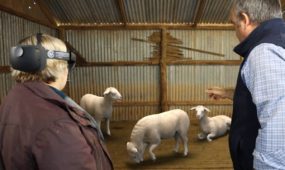Larry eats Big Data to build up artificial intelligence
Technology
A ROBOT with an algorithm-based persona is being used to help companies make data-driven decisions in real time.

Sign up to receive notifications about new stories in this category.
Thank you for subscribing to story notifications.
South Australian company Complexica has developed Larry, the Digital Analyst, which is basically a set of algorithms tuned to complex problems to quickly generate answers that would otherwise take people a very long time to work out.
Big Data software algorithms are taking decision-making to a new level, delivering solutions and efficiencies like never before. The global Artificial Intelligence market is forecast to exceed USD $5 billion by 2020.
Father and son team Matthew Michalewicz and Dr Zbigniew “Mike” Michalewicz, a former professor at the University of Adelaide’s School of Computer Science and Artificial Intelligence pioneer, started the company in 2014 with software architect Constantin Chiriac.
It has quickly signed up 20 companies across a range of industries and aims to scale up to 100 clients within two years.
Customers include PFD Food Services, Liquor Marketing Group, Leader Computers and Coventry Group.
“The problem we identified is that companies want to make data-driven decisions and the way they do that is they hire data scientists, data analysts and it is a very expensive process. So the solution is to create a software robot that automates analytical tasks,” Complexica Managing Director Matthew Michalewicz said.
“Now we have the freedom to go beyond the initial customers with something that is actually proven and functioning in the marketplace.
“With every deployment we make the product more scalable, we make it more robust in terms of what it can do and how quickly it does it.”
Larry is applied to an application layer that is problem specific – a problem could be promotions or pricing, segmented customers or cross-selling and up-selling. End users interact with an application, they push a button, which then goes to Larry to come up with an answer.
In one example, Larry helped formulate a 52-week promotions plan for a national company with 25,000 different products sold in 1400 stores across Australia based on the question of what product should be on promotion at what time of year and at what price to maximise profits. The plan took into account promotional lift, cannibalization in the category and complementary sales.
“It (usually) takes about 30-man days to come up with one plan because you are dealing with 25,000 items over 1400 stores for 52 weeks – it’s like a really big Sudoku,” Michalewicz said.
“But in 60 seconds Larry was able to consider about 10 million combinations of different prices, products, frequency, predict how much more you will sell with all of these combinations and convert them into weekly averages per state and per store.
“The number of combinations and the number of possible outcomes is not infinite but it is close and no matter how big your set of people is it’s impossible for you to consider everything whereas a machine and all the computing power that sits in the cloud can consider things that an organization will never have time to consider.”
Michalewicz said Larry was best suited to large companies that experienced repetitive sales of everyday items such as food, hardware and liquor.
“Businesses that have complexity are going to get much greater benefits from Larry than businesses that don’t. We define complexity by three core things: how big a business is; how many products you sell; and how many customers do youhave.”
Jump to next article



